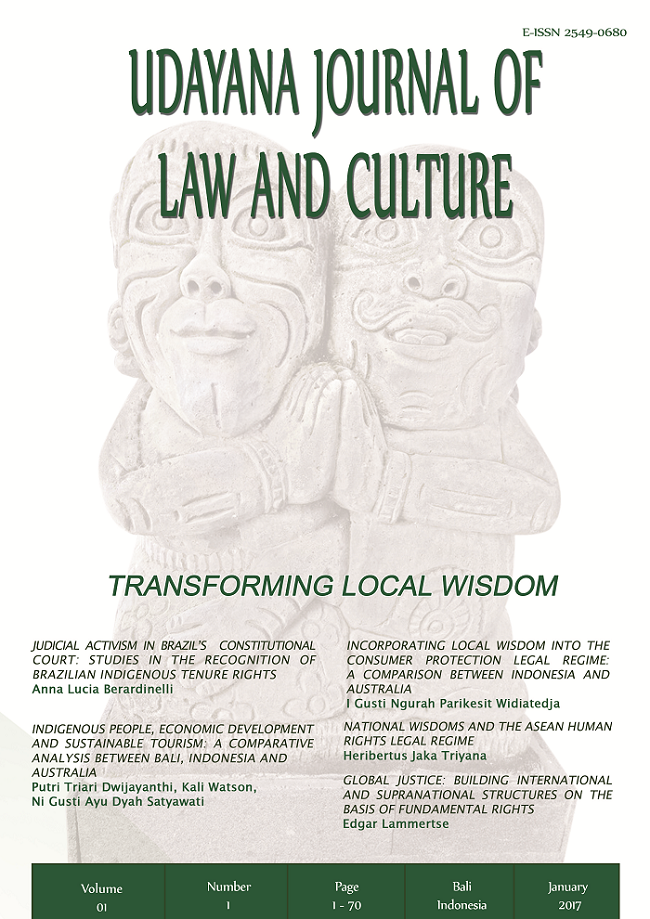Indigenous People, Economic Development and Sustainable Tourism: A Comparative Analysis between Bali, Indonesia and Australia
Abstract
Tourism is one of the world’s fastest growing industries and has been used as a vehicle for indigenous people to engage in economic development opportunities within their local communities. The concept of sustainable tourism has brought greater awareness towards maintaining the economic and social advantages of tourism development whilst ensuring the industry is both socio-cultural and environmentally sustainable. A central component to the definition of sustainable tourism is the empowerment of indigenous people to take advantage of the benefits of the tourism industry. This article will demonstrate that in certain instances there is conflict between indigenous peoples’ culture, particularly communal ownership of land and the tourism industry. This research uses comparative analysis between Bali, Indonesia and the Northern Territory of Australia to analyse the social and legal impediments, which affect the potential of local indigenous people to contribute to sustainable tourism. The conclusion drawn in this article is that both Indonesia and Australia have attempted to provide legal frameworks to promote tourism and development alongside indigenous people, however in both cases the tourism industry has not always been easily applicable to indigenous people’s concept of land ownership and communal sharing of economic assets.
Keywords: Indigenous People, Tourism, Bali, Australia
Downloads
References
Books
Artadi, I Ketut. Hukum Adat Bali. Denpasar: Pustaka Bali Post, 2012
Astiti, Tjok Istri Putra and I Ketut Sudantra, “Reflecting on Tourism Activities in Bali: A Discourse on Communal Rights, Culture and Hindu Values,” in Sustainable Tourism and Law, edited by Michael G. Faure, Ni Ketut Supasti Dharmawan and I Made Budi Arsika. Den Haag: Eleven International Publishing, 2014
Setiady, Tolib. Intisari Hukum Adat Indonesia: Dalam Kajian Kepustakaan, Bandung, Alfabeta, 2013
Journals
Astiti, Tjokorda Istri Putra, Anak Agung Istri Ari Atu Dewi and Michael Faure. “Tourism Development and Customary Land Law in Bali”, Southwestern Journal of International Law20, no.1 (2013): 119-140. http://www.esl.eur.nl/fileadmin/ASSETS/frg/arw/RILE/FRONT.pdf
Brennan, Sean.“Economic Development and Land Council Power: Modernising the Land Rights Act or Same Old Same Old?.” Indigenous Law Reporter10 (4) (2006)
Paper
Fuller, Don, Susan Bandias, and Darius Pfitzner. “Utilizing Aboriginal Land in the Northern Territory.”, https://www.cdu.edu.au/sites/default/files/PaperLeasingAboriginalLand.pdf
Legal Documents
Declaration on the Rights of Indigenous Peoples, GA Res 61/295, UN GAOR, 61st Sess, 107th PlenMtg, Supp No 49, UN Doc A/RES/61/295 (13 September 2007)
United Nations Global Code of Ethics for Tourism
Indonesia. The 1945 Constitution of the Republic of Indonesia
_________. Act of the Republic of Indonesia No. 39 of 1999 concerning Human Rights
________. Act of the Republic Indonesia No.10 of 2009 concerning Tourism
_________. Regulation of the Minister of Home Affairs No.33of 2009 concerning Guidelines for Ecotourism Development in the Region
________. Regulation of the Province of Bali No. 2 of 2012 concerning Culture Tourism of Bali
Australia. Aboriginal Land Rights (Northern Territory) Act 1976
________. Aboriginal and Torres Strait Islander Heritage Protection Act 1984
________. Protection of Movable Cultural Heritage Act 1986
________. Environmental Protection and Biodiversity Conservation Act 1999
Case Law
Mabo and Others v. Queensland (No. 2) (1992) 175 CLR 1
Internets
Akin, Amost. “Aboriginal land rights out of step.“http://www.theaustralian.com.au/news/features/aboriginal-land-rights-out-of-step/story-e6frg6z6-1227007700222
Australia International Tourism Industry. “Productivity Commissions Research Paper.” 2http://www.pc.gov.au/research/completed/international-tourism/international-tourism.pdf
Director of Parks Report. “Parks Australia: Sustainable tourism overview (2011-2016).”https://www.environment.gov.au/system/files/resources/ed9f71b7-edbc-4a9f-801d-0457aa7b763b/files/sustainable-tourism.pdf
Central Land Council. “Land Reform in The Northern Territory: Evidence Not Ideology.” http://www.clc.org.au/files/pdf/ALRA_CLC_Tenure_paper_-_final.pdf
Dudgeon, Wright, Paradies, Garvey & Iain Walker. “Social, cultural and Historical Context of Aboriginal and Torres Strait Islander Australians.” http://aboriginal.telethonkids.org.au/media/54859/part_1_chapter3.pdf
Gadjah Mada University. “Menjaga Hutan Ala Masyarakat Kajang dan Tenganan.” http://www.ugm.ac.id/en/berita/4593-menjaga.hutan.ala.masyarakat.kajang.dan.tenganan.
Hasan, Rofiqi. “Bali Inginkan Bagi Hasil Pendapatan Pariwisata.” http://nasional.tempo.co/read/news/2015/09/09/058699194/bali-inginkan-bagi-hasil-pendapatan-pariwisata
James, Dina, JocSchmeiechen. “Enriching the Experience.” http://www.crctourism.com.au/wms/upload/resources/100024%20James%20Enriching%20the%20Experience%20WEB.pdf
United Nations. “Sustainable Tourism,” https://sustainabledevelopment.un.org/topics/sustainabletourism
United Nations World Tourism Organization. “Global Code of Ethics for Tourism.” http://ethics.unwto.org/en/content/global-code-ethics-tourism
World Tourism Organization, “Definition: Sustainable Development of Tourism,”http://sdt.unwto.org/content/about-us-5
Wranik, Michelle. “Indigenous Tourism in Australia.”http://travel.cnn.com/sydney/visit/indigenous-tourism-australia-906531
Yamaoto, Rie. “Indigenous Tourism and Destination Development.”IIIEE Master’s Theses 2005.https://lup.lub.lu.se/luur/download?func=downloadFile&recordOId=1327691&fileOId=1327692








